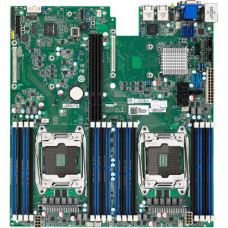Shopping Cart
0 item(s) - $0.00- Accortec, Inc.
- Addon Tech
- Advantech Co., Ltd
- Axiom
- BLACKBOX
- C2g
- Chief Manufacturing
- Cisco
- Dell
- EATON
- EMC
- Enet Components, Inc.
- Fortinet
- Getac, Inc
- HP
- HPE
- IBM
- Intel
- Legrand Group
- Lenovo
- Lexmark
- Middle Atlantic Products, Inc
- Monoprice, Inc
- National Products, Inc
- Panduit Corp
- StarTech.com
- Supermicro
- TDK
- Tripp Lite
- Veritas Technologies Llc
Tyan S7086 Server Motherboard - Intel Chipset - Socket R LGA-2011 - 2 TB DDR4 SDRAM Maximum RAM - DIMM, LRDIMM, RDIMM - 16 x Memory Slots - Gigabit Ethernet - 2 x USB 3.0 Port - 2 x SATA Interfaces S7086GM3NR
Add to Compare
TYAN''s S7086 motherboard is optimized for 2U rackmount chassis deployment. Featuring a spread core CPU socket layout for optimal air flow in a server chassis, the s7086 is ideal for datacenter applications that require the horsepower of a dual Xeon E5-2600v3/v4 motherboard. Expansion and I/OThe S7086 takes full advantage of the PCIe Gen 3.0 lanes provided by the Xeon E5-2600 processors. It features a pair of 24-lane PCIe slots that provide a total of 48 lanes of bandwidth to the rear of a chassis. When paired with TYAN''s M7056-L24-3F and M7056-R24-3F left and right facing 2U riser cards, the motherboard can support a wide variety of expansion cards. The available PCIe riser cards both have (1) physical x16 slot and (2) physical x8 slots. A MUX sits between the x16 slot and one of the x8 slots and allows the riser cards to support either x16/x0/x8 or x8/x8/x8 configurations. Networking OptionsThe motherboard comes standard with three 1000Base-T LAN ports. It also features an OCP v0.5 LAN Mezzanine slot that allows the deployment of a wide variety of additional networking options, including dual and single-port 10GBase-T and 10GBase-SFP+ interface cards. These OCP LAN Mezzanine cards sit flush with the motherboard PCB and do not consume any PCIe slots. Storage OptionsThe S7086 motherboard features (10) SATA ports from the onboard PCH. It also provides an OCP Storage Mezzanine slot that supports one of several LSI SAS controllers, including the SAS2308, SAS3008, and SAS3108. By installing a Storage Mezzanine slot, an additional (8) 6Gbps or 12Gbps SAS ports can be deployed. The storage mezzanine sits beneath the PCIe expansion slots and does not consume any of the PCIe slots in the system. Server ManagementTYAN''s S7086 includes enterprise grade server management via an onboard AST2400 BMC with IPMI 2.0 and a shared IPMI network port. Complete with an HTML based web management portal and Java based Keyboard-Video-Mouse (KVM) redirection, IPMI allows for both the remote viewing of critical system sensors and for complete remote control of the system to be handed to remote support personnel in times of need. Management features such as IPMI help your business lower the TCO of the system by reducing the amount of time and effort expenditure needed by support technicians.
Technical Specifications:
Chipset Manufacturer: IntelChipset Model: C612Total Processor Supported: 2Processor Socket: Socket R LGA-2011Processor Supported: XeonNumber of Memory Slots: 16Memory Form Factor: DIMM, LRDIMM, RDIMMMaximum Memory Supported: 2 TBMemory Technology: DDR4 SDRAMMemory Speed Supported: 1866 MHz, 2400 MHz, 2133 MHz, 1600 MHzController Type: Serial ATA/600Intel RSTe: YesRAID Supported: YesRAID Levels: 10, 5, 1, 0Onboard Video: On-board Video ChipsetGraphics Controller Manufacturer: ASPEEDGraphics Controller Model: AST2400Gigabit Ethernet: YesNumber of Total Expansion Slots: 2Total Number of PCI Express Slots: 2Number of PCI Express x24 Slots: 2Total Number of USB Ports: 2Number of USB 3.0 Ports: 2VGA: YesNumber of SATA Interfaces: 2Number of Mini-SAS Interfaces: 2Total Number of Onboard USB Ports: 3Number of Onboard USB 3.0 Ports: 1Number of NVMe Ports: 0Form Factor: Extended ATXWidth: 13"Depth: 12"Package Contents:
- 2U Optimized Xeon E5-2600 v3/v4 Server Motherboard, 1 x Quick Installation Guide, 1 x TYAN installation CD
Write a review
Your Name:Your Review: Note: HTML is not translated!
Rating: Bad Good
Enter the code in the box below:


